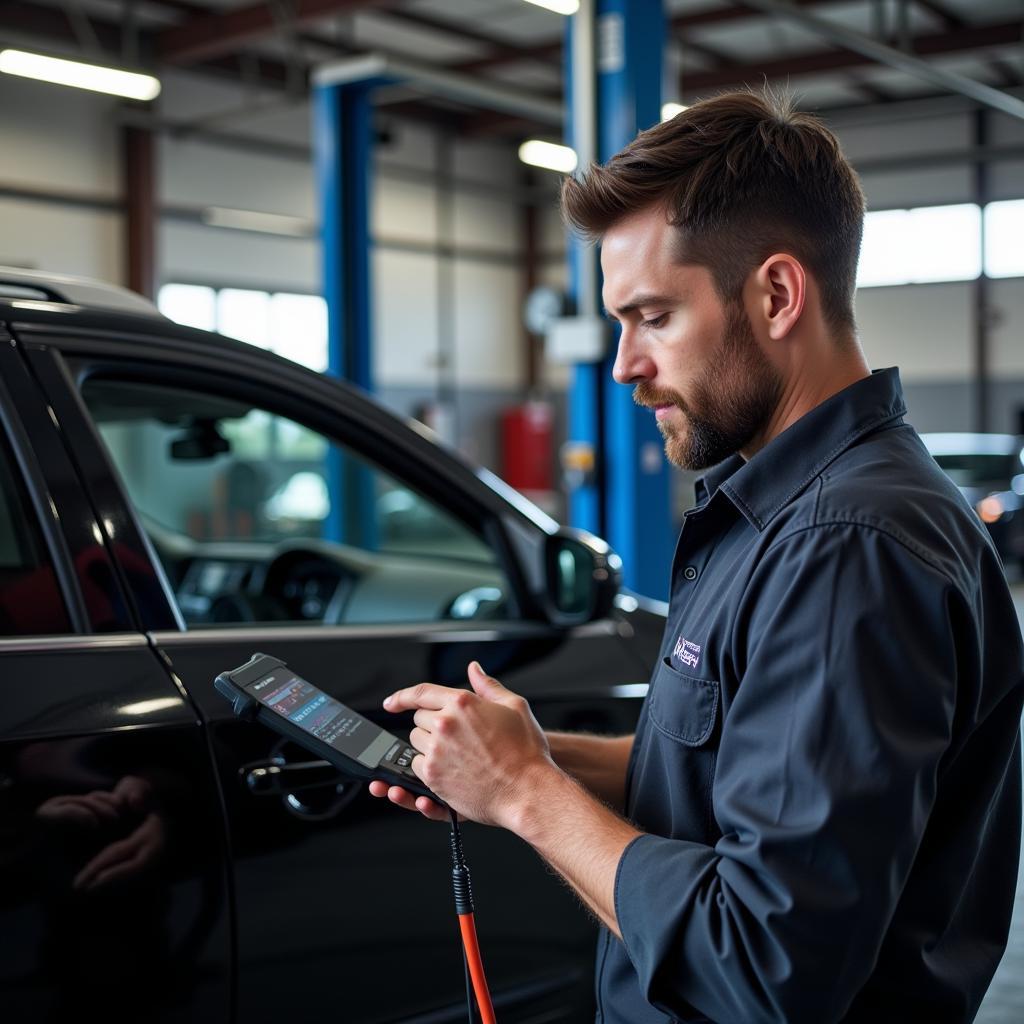Choosing the right car diagnostic tester can feel overwhelming with so many options available at different price points. Whether you’re a seasoned mechanic or a DIY enthusiast, understanding Car Diagnostic Tester Prices and the factors that influence them is crucial. This guide will explore everything you need to know about car diagnostic tester prices, helping you make an informed decision that aligns with your needs and budget.
Understanding Car Diagnostic Testers: More Than Just a Price Tag
Before we delve into the specifics of pricing, let’s clarify what a car diagnostic tester is and why it’s an essential tool for any car owner.
A car diagnostic tester, also known as an OBD2 scanner, is a device that connects to your vehicle’s onboard computer (ECU) to retrieve diagnostic trouble codes (DTCs), real-time data, and other essential information about your car’s health.
Think of it as a window into your car’s brain, providing valuable insights that can help you:
- Diagnose engine problems: Identify the root cause of check engine lights, misfires, or other performance issues.
- Monitor sensor data: View real-time data from various sensors, including oxygen sensors, MAF sensors, and coolant temperature sensors.
- Reset warning lights: Clear DTCs and reset warning lights after repairs.
- Analyze emission readiness: Check if your car is ready for emissions testing.
- Access hidden features: Some advanced scanners unlock hidden features or enable customizations.
Factors Affecting Car Diagnostic Tester Price
Car diagnostic tester prices can range from under $20 to over $1000, depending on several factors:
1. Functionality and Features
The most significant factor influencing price is the scanner’s functionality.
-
Basic Code Readers: Starting at the lower end, basic code readers primarily retrieve and clear DTCs. These are suitable for DIYers who want to understand why their check engine light is on.
-
Mid-Range Scanners: Offering more features like live data streaming, graphing capabilities, and some bi-directional controls, mid-range scanners cater to more advanced users and small workshops.
-
Professional-Grade Scanners: Professional-grade scanners, often used by dealerships and large repair shops, come equipped with extensive functionalities, including advanced coding, programming, key fob programming, module reprogramming, and comprehensive vehicle system coverage.
2. Vehicle Compatibility
Ensure the scanner you choose is compatible with your vehicle’s make, model, and year. Some scanners specialize in specific car brands, while others offer broader compatibility.
-
OBD2 & EOBD Compliance: All cars manufactured after 1996 in the US and 2001 in Europe comply with OBD2/EOBD standards, ensuring compatibility with most scanners. However, specific models might require specialized scanners.
-
Software Updates: Regular software updates are crucial for maintaining compatibility with newer vehicle models and accessing the latest features. Consider the availability and cost of software updates when making a decision.
3. Brand Reputation and Durability
Investing in a scanner from a reputable brand known for quality and reliability is essential. Consider brands with a proven track record of providing accurate readings, durable hardware, and excellent customer support.
4. Additional Features
Beyond the core functionalities, several additional features can impact the price:
-
Wireless Connectivity (Bluetooth/WiFi): Allows you to connect the scanner to your smartphone or tablet for viewing data, generating reports, and accessing online resources.
-
Display and User Interface: A clear, easy-to-read display and an intuitive user interface enhance the overall user experience.
-
Data Logging and Reporting: The ability to log data, generate reports, and share information with a mechanic can be valuable for troubleshooting complex issues.
Finding the Right Car Diagnostic Tester for Your Needs
Navigating the world of car diagnostic testers doesn’t have to be daunting. Here’s a breakdown of typical price ranges and what to expect:
$20 – $100: Basic Code Readers
- Ideal for DIYers
- Read and clear DTCs
- Limited functionality
- Might not offer live data or bi-directional controls
$100 – $500: Mid-Range Scanners
- Suitable for car enthusiasts and small workshops
- Offer live data streaming and graphing
- Some bi-directional control capabilities
- Might have limited vehicle-specific functionalities
$500 – $1000+: Professional-Grade Scanners
- Designed for professional mechanics and dealerships
- Extensive functionalities, including coding and programming
- Comprehensive vehicle coverage
- Often come with subscriptions for software updates and support
 Mechanic Using a Professional-Grade Scanner in a Garage
Mechanic Using a Professional-Grade Scanner in a Garage
Expert Insight
“Investing in a quality car diagnostic tester is an investment in your peace of mind,” says John Smith, a seasoned mechanic with over 20 years of experience. “A reliable scanner can save you time, money, and frustration in the long run by helping you diagnose problems accurately and avoid unnecessary trips to the mechanic.”
Conclusion
Finding the right car diagnostic tester comes down to understanding your needs, budget, and the features that matter most to you. By considering the factors outlined in this guide, you can confidently choose a scanner that empowers you to take control of your vehicle’s maintenance and repairs. Remember, a well-chosen car diagnostic tester is not just an expense; it’s an investment in the longevity and performance of your vehicle.

Leave a Reply